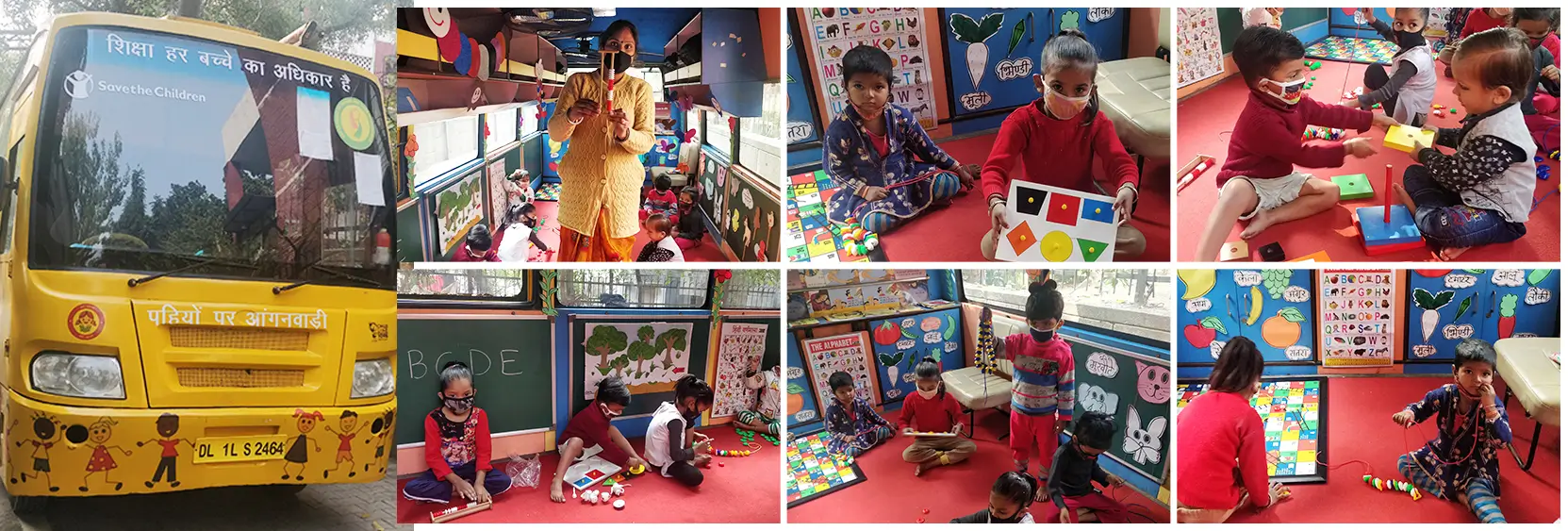Mobile learning centre: an initiative to take learning and hope to the doorsteps of delhi children
In a small corner on Kalibari Road in New Delhi is a makeshift hut. Inside the hut is a small cot and a few cooking utensils. Clothes hang from a clothesline outside the hut. A tent-like canopy serves as the roof of the hut. This is the home of 3-year-old Ujjwal. His father is ill and unemployed, his mother cleans public toilets. While his father occupies the cot, he sleeps with his mother on a mat on the floor, braving Delhi’s brutal winter. Meals are eaten outside on the pavement and the public toilet nearby serves as the family washroom. Amid this unimaginable hardship, there’s one thing that Ujjwal looks forward to – spending time with his best friend Kabir on Bal Raksha Bharat’s Mobile Learning Centre bus.
Tillu and Laddoo as Ujjwal and Kabir are fondly called are inseparable on the bus. They met first time on the bus and since then they do all their activities together. Ujjwal’s teacher, Asha Vohra, who conducts the activities on the Mobile Learning Centre bus, says Ujjwal is one of the most enthusiastic students. He is usually the first one to volunteer and participate in anything. Ever since he has been attending classes on the MLC bus, Ujjwal’s mother started confiding in Asha about her problems and feels reassured that her son is safe on the bus and not roaming around unsupervised.
A mapping study conducted in 2019 revealed that over 80,000 children are living in street situations in the state of Delhi. These children are living a life of exclusion and have remained outside the reach of government services such as basic preschool learning, formaI education and opportunities of skilling. To ensure that children in street situations within the age of 0-6 years have access to quality education, Bal Raksha Bharat in collaboration with State Government of Delhi introduced two Mobile Anganwadi Centres (buses) or Mobile Learning Centres equipped with creative learning materials and audio-visual equipment. It has storybooks, board games, letter charts, flash cards, crossword puzzles and building block sets to teach children basic language and math. Each bus has a bus driver, academic support fellow and an outreach worker.
Before the formal launch of October 11 – International Day for the Girl Child – two routes were identified. One in the Central district and the other in the North and North West of Delhi. The buses reach up to 240 children in street situations (120 in each bus) in the age group of 3-6 years, providing Integrated Child Development Services. Approximately 70% of these children will be mainstreamed into formal Anganwadi centres and schools. Parents of all 240 children in street situations were reached out through community mobilization and meetings. The team did a detailed recce to finalise a parking spot that is free of any low hanging wires, have less vehicular traffic and is close to a public toilet. Trust building exercises and meeting were held with the parents to ensure their children registered for the classes.
Asha, who has been teaching pre-schoolers for the past 15 years, said, “When they started, these children did not know anything. Now, they have started taking interest in their classes and want to learn more.” She knows all her students by their name, where they live and is a friend and confidante to their mothers. Apart from learning support, the mothers are counselled on child nutrition, personal hygiene and handwashing practices. Some of the children are even given remedial classes.
Madhu whose four-year-old daughter attends the classes on the bus is a relieved mother. “My daughter loves going to the bus for her lessons. She gets ready on her own to go for the classes and comes back and tells me everything that she’s learned. I am relieved that she’s learning in a safe environment and not roaming around the slum,” she said. Her daughter has started going for tuition classes for her school admission.
It’s not just the parents who want to ensure education for their children. The older siblings too want their younger brothers and sisters to get the benefit of the Mobile Learning Centres. Evelen-year-old Shabnam who lives in the Kalibari slum, wants her one-and-half-year-old brother to enrol for the classes. Both her parents go out to work every day and she’s the one who takes care of the household chores and takes care of her younger siblings. “If my brother attends classes on the bus then I don’t have to worry about him and will get some time to do my household chores. Moreover, he needs to get educated,” says Shabnam.
The concept of Mobile Learning Centre buses is not new to Bal Raksha Bharat. These buses have travelled many states, including Maharashtra, Telangana and now in Karnataka and Delhi. West Bengal was the first state to start this program. A development model that was conceptualised and implemented in 2011 continues to impact lives, bring education to every marginalised child.
Support our work for India’s most marginalised children by making an online contribution HERE. These children need a help hand, more so in these pandemic times.




